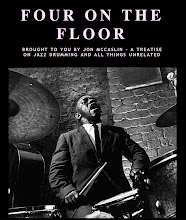Quincy Davis, Assistant Professor of Drum Set at the University of North Texas, recently released his latest musical offering Q Vision.
These are challenging times to say the least and my hat is off to all those artists who have chosen to release their new music in the face of our current circumstances. Despite the fact that the usual means for artists to perform, tour and promote their music in person have pretty much vanished (for now...) I still think there is tremendous significance in what these artists are offering and I think it takes a lot of courage to do so. In times of adversity we need these artists, such as Quincy, who are standing up, leading by example and offering us a sense of hope. When I hear compelling new music these days, such as Q Vision, I am inspired and reminded that "this too shall pass" and that we have much to be thankful for and much to look forward to.
With that in mind, I am reminded of this quote:
"Music is medicine!"
- Ra Kalam Bob Moses
I've always been a big fan of Quincy's drumming and of his original music. Quincy has played as a side person with many jazz greats over the years and I think this has really informed his own personal approach as a band leader and as a composer. He brings together a lot of different modern influences to his music while also still deeply rooted in the tradition.
Quincy was kind enough to take some time out of his busy teaching schedule at UNT to answer a few questions about his music (thank you Quincy!):
Quincy Davis Interview - Four on the Floor November 2020
1) Tell us about your latest recording! How did you choose your repertoire and sidemen? What inspired you to pursue the vibe and instrumentation that you did? Was there a particular message you were trying to convey to the listener?
For Q Vision, I wanted to move away from the vibraphone/sax quintet configuration of my first album (Songs in the Key of Q). But I did not want to completely abandon the quintet sound because I love it so much. So I decided to have both configurations on this album.
The music is all original music that I wrote specifically for this album and with these wonderful musicians in mind. I wanted to write music that was “easy on the ears” yet engages the brain, is fun to play and contains various aesthetics of the blues. I am always trying find the perfect balance of these elements. All of the musicians on this album are musicians who play with both intelligence and a lot of heart and soul. These traits are very important to me when considering someone for my band.
Q Vision is all about having vision of many different perspectives all at the same time: The drummer’s vision of their instrument, musician’s vision of music as a whole, vision from the music enthusiast’s perspective and vision and consciousness of things that are happening to people in the world.
2) Who are your influences, on and off the drums, and why?
My biggest influences include Billy Hart, Gregory Hutchinson, Bill Stewart, Philly Joe Jones, Carl Allen, Ed Blackwell, Dave Weckl and Clyde Stubblefield. All of these musicians are grounded in the tradition while playing in a very forward-leaning manner. Tradition is extremely important to me but I never want to be stuck only playing in that way. Jazz is ever evolving and I want to evolve with it. In addition, European classical music from the romantic and 20th century periods have influenced my overall perspective of music and composition quite a lot.
3) What are you practicing and listening to these days?
I’m doing a lot of metronome displacement exercises to improve my natural sense of time and pulse. My listening skills and ability to stay aware of what’s going on with the time and feel are also strongly challenged when doing these exercises.
4) What other current and future projects do you have on the go at the moment?
The biggest future project that I am working on is a method book. I am hoping to have a book come out in 2021. This book will incorporate many of the concepts I have been using in my teaching for the past 10 years. It will also be used as a part of the University of North Texas drum set curriculum.
5) What advice do you have for younger, aspiring jazz drummers?
If you want to play jazz professionally, understand today’s jazz drummer needs to be able to play many different styles comfortably so listen to as much music as possible. Also, study and KNOW the history of the instrument and the music. You can’t learn that stuff on Instagram!
To learn more about Quincy and check out his music visit his website www.quincydavisjazz.com
Quincy has also been quite busy with his ongoing YouTube channel, offering great lessons in his always informative Q-Tip series:






















No comments:
Post a Comment